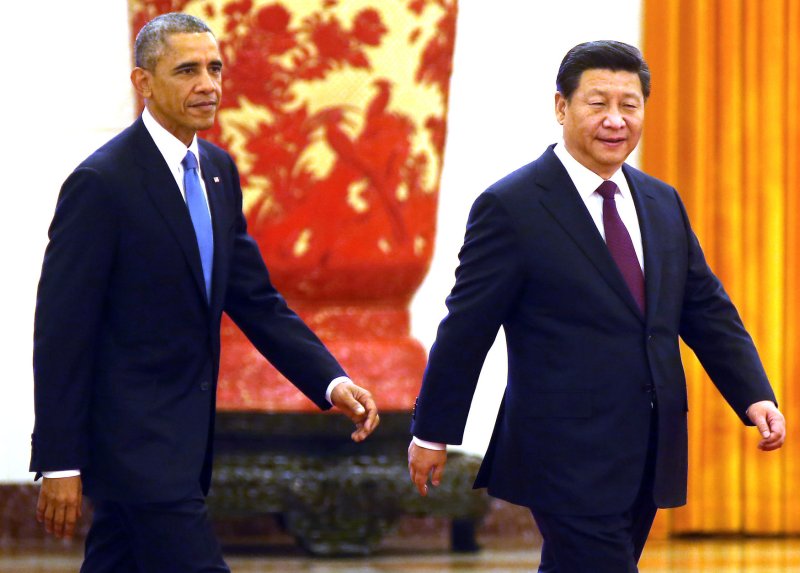U.S. President Barack Obama (L) and Chinese President Xi Jinping attend a welcoming ceremony at the Great Hall of the People in Beijing on November 12, 2014. President Obama is in China's capital to attend the APEC Leaders' Meeting and to discuss economic, security and human rights issues. UPI/Stephen Shaver |
License Photo
President Barack Obama evidently has learned little from the lessons of Iraq and Afghanistan. And even less about the 16-year-war in Vietnam. As for the Korean War, it might be worth remembering the U.S. Army is still there after 64 years.
The 13-year Afghan war, designed to punish and eliminate Taliban for its support for al-Qaida following 9/11, is grinding down after well over $1 trillion spent, 2,250 U.S. killed and 19,000 wounded.
And what happened to Taliban? As the U.S. kept shrinking its presence, Taliban kept expanding.
As POTUS plunges back into Iraq with U.S. military advisers in the fight against the spreading Islamic State cancer, U.S. generals are warning that we must reckon on a multi-year commitment.
U.S. air power coupled with military advisers but without U.S. ground troops cannot do much without a muscular Iraqi army. Iraq once had such a force but it was disbanded following the U.S. invasion of 2003 to depose Saddam Hussein and neutralize his nuclear arsenal.
The arsenal turned out to be figment of a defector's imagination, swallowed hook, line and sinker by U.S. intelligence.
Russia and China, meanwhile, are edging cautiously to a de facto alliance as the one-time U.S. global giant has opted once again for the quicksands of Iraq, where Iran now appears to have gained the upper hand.
President Obama evidently believes that he has put the U.S. relationship with China back on track with a long-range deal to cope with their respective carbon polluters. The U.S. agrees to reduce emissions by 26 to 28 percent by 2025, and China will try to reach peak emissions by 2030 before reducing.
Before the ink was dry, Republican spokesmen warned such a deal would be blocked by their newly elected majority in both houses of Congress.
"It is the latest example of the president's crusade against affordable, reliable energy that is already hurting jobs and squeezing middle-class families," said House Speaker John Boehner.
For the immediate future, China can see the U.S. saddled with a dysfunctional system of government, crumbling national infrastructure, while at the same time doubling down in Iraq.
As President Xi Jinping reads the U.S. tea leaves, public opinion is more interested in what Washington plans to do about crumbling national infrastructure than the much-touted "pivot to Asia."
For detached observers, both foreign and domestic, there now appears to be a pivot back to a no-win war in Iraq.
China and Russia now see the U.S. giant saddled with a gridlocked dysfunctional system in a new world where national sovereignty demonstrates daily it does not have the answers for transnational crime and terrorism.
Retired U.S. army lieutenant general Daniel R. Bolger, the author of "Why We Lost," argues that another surge in Iraq cannot win the day against IS. "If insanity is defined as doing the same thing over and over and expecting different results, I think we're there."
The alternative to another defeat, Bolger argues, is to keep harassing the Islamic state, degrade its forces, and play the long game at the lowest possible cost.
This, too, sounds like recipe for another military boondoggle with the worst aspects of the Vietnam, Iraq and Afghan wars.
President Obama evidently believes the U.S. finally has a reliable partner in Baghdad. The notion that the al-Abadi government is now inclusive and reliable is greeted with derision.
Government-sanctioned violence against Sunnis continues in Diyala province where they suffered torture and executions. And in northern Iraq, Shiite militia are seen as almost as bad as IS.
U.S. supplied weapons in Baghdad are known to have been used by Shiite factions to suppress Sunni militia. An inclusive government in the Iraqi capital is still a fantasy in some intelligence reports.
This week, the Iraqi military announced dramatic changes in its command structure to fight corruption. Twenty-six senior military officers were removed from their commands. Ten were forced to retire, including Army Chief of Staff Babacar Zebari.
Iraqi Prime Minister Haider al-Abadi says the time has come to restore the public's confidence in the military after a string of defeats required drastic action against corruption, which he described as big a threat as terrorism.
The most concerned countries about Iraq in the Middle East are Turkey, Jordan, Iraq, Kuwait, Saudi Arabia and other Gulf countries. But they all want the U.S. to do the job for them.
In bottom line Arabic, isn't the time at hand for the U.S. to tell its Arab and regional friends and allies that history beckons?
We are told they are all fearful of extremist Islamist backlashes on their home fronts? Egyptian cleric Mahmoud Shaaban says yes to dialogue with IS and no to fighting it "and wreak vengeance upon the treacherous Americans, wherever they may be."
But wouldn't this be a lot more serious if IS were allowed to prevail in Iraq?















